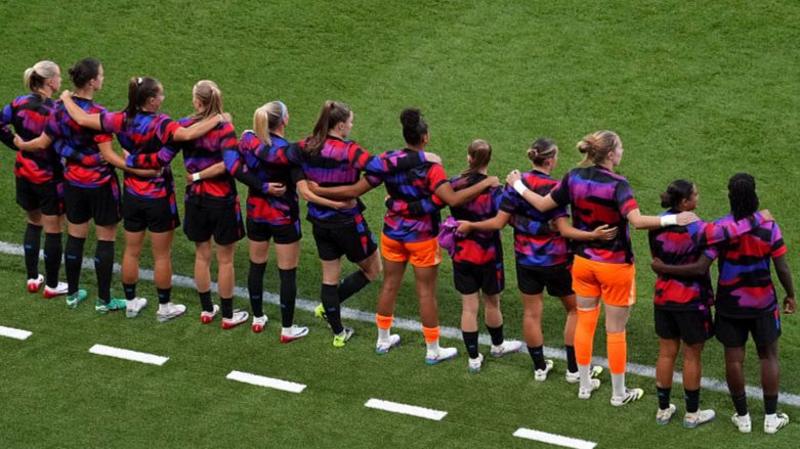England Team Unites in Powerful Show of Support for Carter




Ahead of the whistle for the Euro 2025 semi-final, the atmosphere was charged not only with anticipation for the high-stakes match but also with a subtle shift in the pre-game ritual of England's women's team. The Lionesses, a squad known as much for their prowess on the field as for their commitment to social causes, made a significant change during their lineup. This time, they chose to stand, discontinuing the practice of taking the knee, a gesture that had become a global emblem of the fight against racial injustice.
The practice of taking the knee was popularized in sports by American footballer Colin Kaepernick in 2016 and was adopted by football teams around the world following the global upsurge in awareness and protests against racial inequality after the death of George Floyd in 2020. The gesture has been a staple at football matches across leagues, often seen during the line-ups at the start of the games as athletes demonstrated their solidarity with the Black Lives Matter movement.
The decision by the Lionesses to stand, as stated through their spokesperson earlier in the tournament, comes after thoughtful consideration among the players who felt that the time had come to evolve their method of highlighting social issues. The England team has a rich history not only in their sporting achievements but also in their social impact, notably pushing for equal pay and addressing gender disparities in sport. This new shift signifies another chapter in their ongoing commitment to advocacy, signaling that while the method may change, their dedication to justice and equality does not waver.
During the semi-final, the substitutes also showed their unity but in a slightly different manner, linking arms along the touchline. This continued show of solidarity, albeit in a new form, highlights how team actions can spotlight important issues in different ways, while still aiming to foster conversation and awareness.
This change of gesture has been met with mixed reactions from fans and commentators alike. Some see it as a natural evolution of the protest - a way to keep the movement fresh and maintain public engagement. Others feel that abandoning the knee might dilute the powerful message it sends about the urgency and persistence of racial injustice. However, the team insists that their commitment to fighting inequality, both in sport and in wider society, remains as strong as ever.
As the tournament progresses, the focus of fans and media also remains split between the actions on the field and the statements made off it. The England team, under intense pressure to perform after their strong showing in previous international outings, is expected to not only compete at the highest level but also carry the torch for ongoing issues that transcend the sport.
The sports community often reflects broader societal trends and the actions of teams like the Lionesses serve as a barometer for cultural shifts and awareness. It will be interesting to observe how other teams and leagues respond to this new phase of athlete activism. Will they mirror England's evolution, or will they stick with the familiar gesture that has marked football fields for several years now?
No matter the outcome of the Euro 2025, the England women's team has already made headlines, using their platform to promote a conversation far beyond their athletic performance. Their actions remind us that sports can be more than just games and athletes more than just players; both can be pivotal in driving social change. As the conversation around tactics and transitions in athlete-led activism continues, the global sports community watches and learns, adapting and evolving in its complex role as a social influencer.